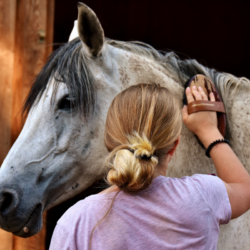In an ideal world, long walks, games, a bowl full of food and a few scratches would be enough to make a dog happy. But the reality is a little more complicated. For the well-being of our four-legged companions, care and excellent hygiene are essential. And that includes parasite control! Because once fleas or ticks have taken hold, the comfort and health of the whole family are threatened. Fortunately, there is now a wide range of anti-parasite devices available to prevent or stop contamination. One of these is the pest control collar. Practical to use, they work immediately and last for a long time. The key is to choose the model that best suits your hairball. But how?
Dogs are incredibly affectionate and loyal pets, but it’s important to remember that they need regular care and attention to stay healthy. Parasites, such as fleas and ticks, can cause illness in dogs, so it’s important to take steps to protect them from them. Using an anti-parasite collar is an effective way of protecting your dog from these parasites. In this article, we’ll explain how to choose the best anti-parasite collar for your dog.
The different types of anti-parasite collar
There are several different types of dog collar, each with its own advantages and disadvantages. The most common types are :
- Flea collars are designed to prevent and eliminate fleas. They contain chemicals such as permethrin or pyrethroid that kill fleas on contact. These collars are effective for around six months and are generally inexpensive.
- Tick collars are designed to prevent and eliminate ticks. They generally contain ingredients such as amitraz or deltamethrin. These collars are effective for about six months and are also inexpensive.
- Broad-spectrum pest control collars are designed to prevent and eliminate both fleas and ticks. They usually contain ingredients such as permethrin and amitraz. These collars are also effective for around six months, but are a little more expensive than flea or tick collars.
Factors to consider when choosing a pest control collar
When choosing a pest control collar for your dog, it’s important to consider a number of factors to ensure you choose the best collar for your pet. Here are a few factors to consider:
- Your dog’s size: It’s important to choose a collar that fits your dog’s size. If you choose a collar that is too small, it may not be effective in protecting your dog from parasites. If you choose a collar that’s too big, it could slip off your dog’s neck or be too loose to be effective.
- How long it lasts: How long the collar lasts is also an important factor to consider. If you choose a collar that only works for a few weeks, you’ll have to buy a new one more often. This can be expensive in the long run. It is best to choose a collar that is effective for at least several months.
- Active ingredients: It’s important to know the active ingredients in the pest control collar you’re considering.
How does a flea collar work?
Depending on the model, the anti-parasite collar either repels or kills external parasites (fleas, ticks, mites, sandflies, lice, etc.). The fastener, which is either a small textile strap or a leather thong to be placed around the animal’s neck, serves only to diffuse the active substance with which it is impregnated. The anti-flea or anti-mite collar will then distribute the repellent slowly and continuously to act all over the animal’s fur, until it is exhausted. This provides long-lasting protection, sometimes for up to 8 months.
There are two main types of collar: insecticide collars and insecticide collars. Insect repellent collars are soaked in a repellent based on essential oils and plant extracts, and work to keep unwanted insects away and prevent them from settling in. The latter contain a plant protection product (deltamethrin, flumethrin, imidacloprid) designed to exterminate parasites.
Insect-repellent anti-parasite collars or insecticide-impregnated collars, which should you choose?
You want the best for your four-legged friend! For reasons of tolerance to the repellent active ingredients, but also for ecological reasons, we might advise you to favour collars with natural repellents all the time. However, depending on the purpose of the treatment and the animal’s lifestyle, a powerful insecticide anti-parasite collar may be considered.
In fact, an insect-repellent collar is more than enough if your dog doesn’t go out often, has little contact with other animals, or if a single parasite (fleas, for example) is targeted. On the other hand, when Toby goes for walks and often plays outside with “friends”, he is inevitably exposed to external parasites of all kinds. In this case, insecticide treatment is a must!
How to choose the best anti-parasite collar for your dog
Now that we’ve looked at the different types of anti-parasite collars and the factors to consider when buying one, here are a few tips to help you choose the best anti-parasite collar for your dog:
- Consult your vet: It’s always advisable to consult your vet before buying a pest control collar for your dog. Your vet will be able to advise you on the type of collar best suited to your dog and give you specific recommendations based on its breed, age and size.
- Check the active ingredients: Be sure to check the active ingredients in the pest control collar you are considering. Some ingredients may not be suitable for all dogs and may even be toxic for some. It’s important to read the label carefully and understand the ingredients to avoid any adverse effects on your dog. If your dog has difficulty tolerating collars, you can try using Adtab flea tablets, which are effective for up to a month.
- Choose a water-resistant collar: It’s important to choose a water-resistant flea collar to avoid rapid deterioration. If your dog likes to swim or bathe, a water-resistant collar will be more effective and long-lasting.
- Avoid cheap collars: Although cheap pest control collars may seem like a good deal, they may not be as effective or durable as more expensive collars. It’s best to invest in a quality collar to ensure your dog is protected from pests.
- Replace the collar regularly: Even the most effective pest control collars have a limited lifespan. It’s important to replace the collar regularly to ensure constant protection against parasites. In general, collars should be replaced every six months.
Three criteria for choosing the right anti-parasite collar for your dog
The size of the dog collar :
Generally speaking, pest control collars on the market today come in two sizes. One for dogs weighing less than 8 kilograms, and a longer one for dogs weighing more than that. You need to choose the right size for your hairball, to ensure it’s comfortable (neither too tight nor too loose, so it’s easy to remove) and provides really effective protection against fleas and ticks.
Please note: anti-parasite collars are strictly reserved for dogs aged over 7 weeks, as the “toxic” charge they contain could harm the health of younger puppies.
The right treatment:
You can also choose an anti-parasite collar according to its mode of action. Natural insect repellents, which prevent parasites from taking hold by making them flee, work mainly to prevent new infections. On the other hand, if fleas or ticks are already present, an insecticide treatment is preferable. For this reason, the insecticide anti-parasite collar is more suitable as a “cure” treatment.
The active substance to treat a particular parasite
Finally, you can choose your dog’s anti-parasite collar according to the substance it releases. In the case of insecticidal anti-parasite collars, we know that imidacloprid is effective against fleas, while flumethrin and deltamethrin are more effective against ticks. In this category, it’s hard not to mention the powerful deltamethrin action of the Scalibor tick collar, which works for up to 6 months against both ticks and sandflies.
That said, for double disinfection and flea/tick protection, nothing beats the Seresto (Bayer) small dog flea/tick collar, also available in large dog format. Combining imidacloprid and flumethrin, these anti-parasite collars promise 8 months’ protection against both ticks and fleas. They are also effective against the recently discovered sandfly.
As for insect repellents, the active ingredients are generally essential oils with a reputation for scaring away all undesirable insects.
Choosing the best anti-parasite collar for your dog is important to ensure he is protected against parasites. By taking into account your dog’s size, duration of effectiveness, active ingredients, water resistance and price, you can choose the best anti-parasite collar for your pet. It’s also advisable to consult your vet before buying a parasite collar for your dog to make sure you’re making the best decision for your pet’s health.
FAQs
- How long does a dog pest control collar last? Answer: In general, anti-parasite collars are effective for about six months.
- Are pest control collars safe for dogs? Answer: Pest control collars can be safe for dogs if they are used in accordance with the manufacturer’s instructions. It is important to check the active ingredients and consult your vet before using a pest control collar on your dog.
- Can pest control collars cause skin reactions in dogs? Answer: Some dogs may be sensitive to the active ingredients in pest control collars and may develop skin reactions. If you notice any redness or irritation on your dog’s skin after using a pest control collar, contact your vet.
- Are anti-parasite collars effective against all parasites? Answer: Parasite collars can be effective against many different types of parasite, but it’s important to check the active ingredients and instructions to make sure the collar is effective against the specific parasites you want to eliminate.
- Can an anti-parasite collar be used in combination with other anti-parasite treatments? Answer : It is important to consult your vet before using a pest control collar in combination with other pest control treatments to avoid any undesirable effects or overdosing. Your vet will be able to advise you on the best way to protect your dog against parasites.






My dogs loved to swim during the summer months, does the Seresto dog collar remain active
when its gets wet frequently?
Regards Patricia
Dear Patricia,
the Seresto collar’s actives are water resistant, your dogs will be safe,
Best regards,
Elodie